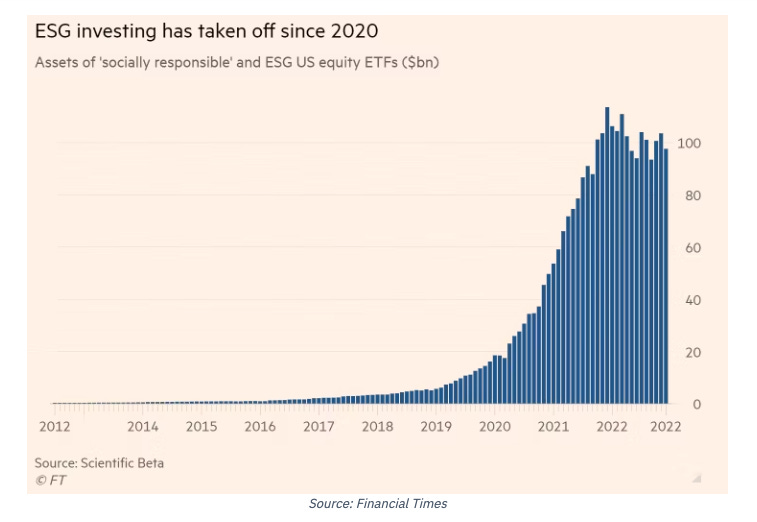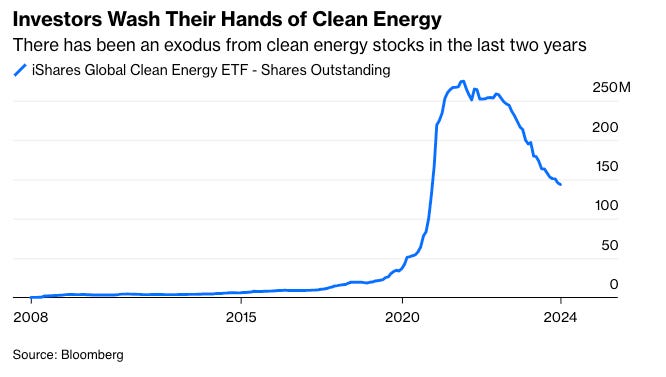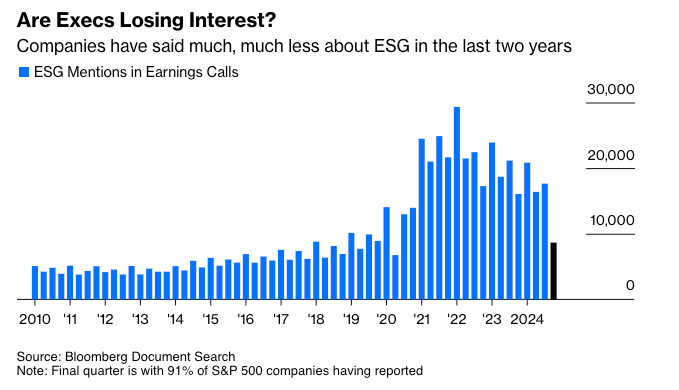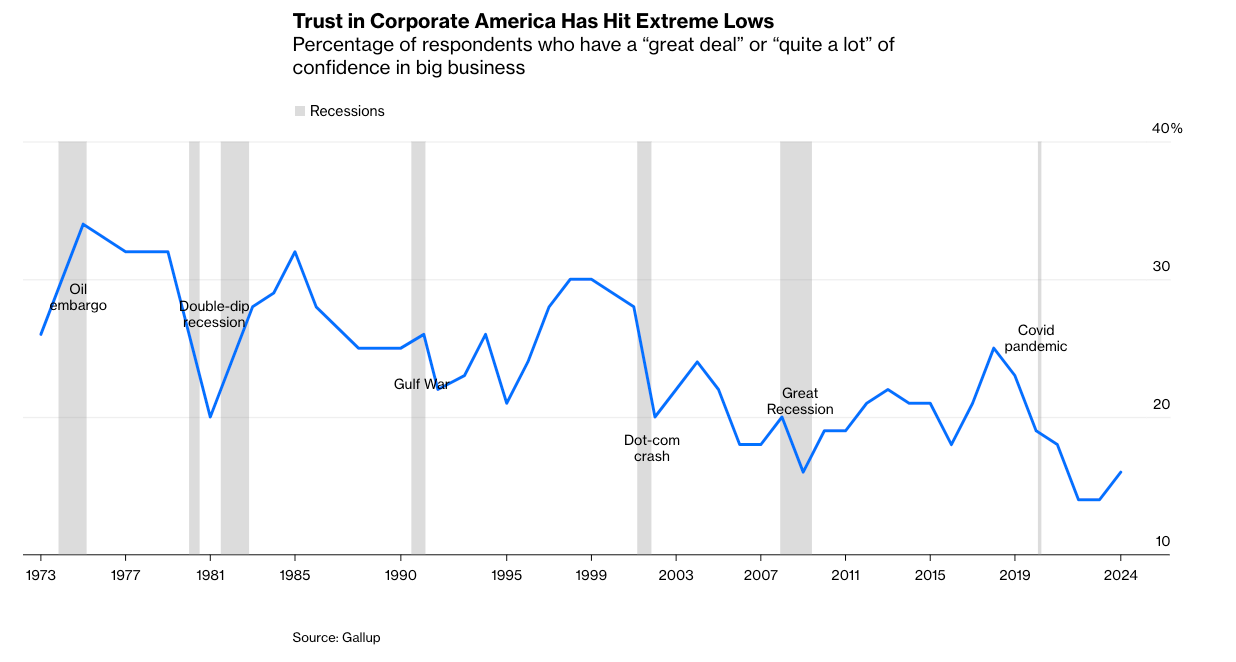TCC #49: Sustainability is operating in a trust vacuum
If not, 'saving the planet' — then what?
Is it just me, or does it seem like trying to make the world a better place is suddenly something people don’t want to be associated with?
Meta ends diversity programs, joining McDonald's, Walmart and other major companies to back off DEI
2024 was the hottest year on record. The reason remains a science mystery
Major banks are abandoning their climate alliance en masse. So much for ‘woke capital’
*sigh*
Okay, so not just me?
The vibe shift is palpable!
What does it all mean for sustainability communicators?
How did we get from this:
… to this overwhelming backlash against anything that feels remotely… good?
It all feels like a larger cultural reckoning — one rooted in cynicism and wow-sooOoo-much fatigue.
Consider this:
Only 16% of Americans have “a great deal” or “quite a lot” of confidence in major companies, down from 30% in 1999
Among young adults (18-29), just 40% have a very or somewhat positive view of capitalism
It’s all coming to a head through people actively rejecting anything that looks or feels like virtue signaling. This backlash doesn’t just hurt DEI and ESG initiatives. It threatens the credibility of the entire sustainability movement.
If ‘saving the planet’ and ‘making the world a better place’ are no longer winning narratives, what do we replace them with?
The death of virtue signaling
Perhaps we’re not seeing the ‘death of ESG,’ but rather the death of virtue signaling.
Public trust in corporations has eroded to such an extent that people no longer believe the promises they hear. Many actively distrust companies that appear to align with progressive values. What used to be seen as ‘doing good’ is now dismissed as virtue signaling or outright hypocrisy.
This backlash isn’t without reason
We’ve had decades of performative action: net zero pledges with no accountability, and DEI initiatives that now appear to have been more concerned with optics than outcomes.
The backlash against ‘woke’ capitalism isn’t just a fringe movement. From boycotts of Bud Light and Target to political campaigns attacking ESG principles, there’s a growing perception that progressive corporate efforts are out of touch with the average consumer. And considering the outcome of the recent U.S. election, I’d say that perception is right. (No pun intended.)
People are tired of being told to believe in initiatives that don’t deliver.
So, companies are retreating.
Sustainability communicators should take this as a wake-up call. Vague promises and empty gestures won’t cut it anymore. If you want trust, you have to earn it.
Rebuilding corporate credibility in a post-woke world
For one, this means no more sustainability reports as PR activities. It hasn’t been working anyway; trust in big business is… lacking.
And in a trust vacuum, sustainability needs to deliver. We must focus on tangible, measurable, and impactful results that directly address people's concerns. Hasn’t this always been the case?
Well, maybe not.
Aspirational and idealistic messaging — what Amelia and I like to call ‘save the planet’ messaging — used to work, insofar as it used to win business. But this approach no longer resonates with an increasingly skeptical public. If we want to rebuild trust, we need to rethink how we talk about sustainability entirely.
Abstract, global messaging about climate change and chatter about ‘corporate responsibility’ can feel overwhelming and disconnected from people’s daily lives. Most people are more concerned with how sustainability impacts their immediate reality — paychecks, grocery bills, housing, and energy costs.
The trust vacuum is a challenge, but it’s also a chance to redefine what corporate responsibility looks like. To prove that sustainability is more than just a buzzword.
Stay in your lane
Sustainability must move from being a nice-to-have PR strategy to a fundamental part of how companies operate, creating benefits that matter to people and the planet while proving they’re worthy of public trust.
The empty messaging has got to stop.
The best thing corporates can do right now is focus on the items and issues they can actually make a difference with. Back your comms with tangible action. Bring some effort and honesty to the table.
Take this partnership between Walmart, Sam’s Club, and General Mills as an example. The three companies announced a collaboration to help ‘accelerate the adoption of regenerative agriculture on 600,000 acres in the U.S. by 2030.’
“We are excited by the opportunity to bring our products, including Pillsbury refrigerated dough and Blue Buffalo pet food and treats, to Walmart shelves more sustainably, with the help of our merchants and farmer partners.”
“We’re committing to making the everyday choice the more sustainable choice for consumers. This collaboration is an example of how we are working across our value chain on intentional interventions to help advance regenerative agriculture and ensure surety of supply for these essential food products for the long term.”
Great. It’s a logical initiative. (Though I’d be remiss if I didn’t point out that they missed an opportunity to speak to the impact this collaboration will have on food prices. Hello!)
Start talking $$$$$$
Sustainability communicators would be wise to pay attention to this truth. Political polarization hampers our mission and that will continue to be the case until steps are taken to reverse the problem.
Income inequality is, without doubt, a sustainability issue. Climate change is the backdrop to every issue humanity faces today — and income inequality is the inextricably linked force that shapes our ability to adapt and survive in the face of the former. Without addressing this disparity, sustainability efforts risk perpetuating the very inequities they aim to resolve.
Sustainability communicators should absolutely be advocating for solving income inequality. In acknowledging that it is indeed a sustainability issue, we give ourselves the opportunity to tie sustainability into the things that people care about!
Affordability!
Cost of living!
The fortune I spent on groceries yesterday!
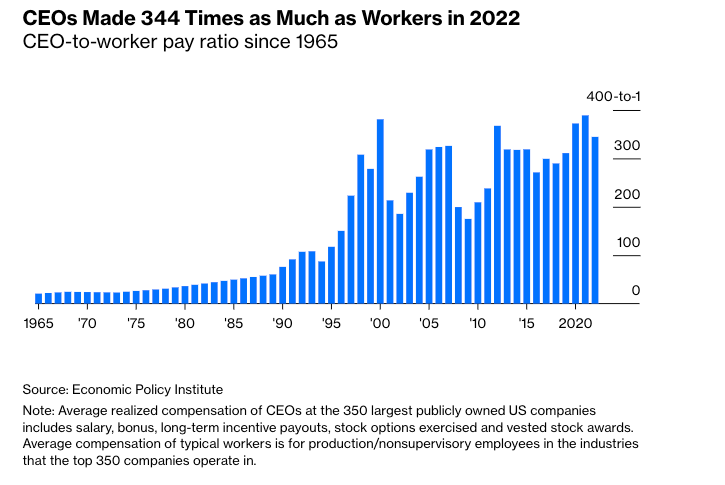
Of course, it could also be the case that the headlines with which I opened this edition are merely doing what they’re meant to — being loud, capturing attention, and horrifying the more reasonable majority (all for the sake of a click) — but they still reflect an important truth.
People are tired: tired of being sold empty promises, tired of performative gestures, and tired of a system that doesn’t seem to deliver anything of real value to their lives.
As sustainability communicators, we need to show how sustainability can make life better in ways that are tangible and immediate. Lower grocery bills. Stable housing. Affordable energy. These are the things people care about, and sustainability initiatives must prove they can deliver. We need to meet people where they are — not in an abstract future, but in their present realities.
A blueprint for moving forward
Get specific
Regenerative agriculture isn’t just good for the environment — it can help stabilize food prices and protect local farmers. And renewable energy isn’t just clean — it’s cheaper in the long run and creates local jobs.
Be transparent
Don’t just announce a bold target; show your progress, warts and all. Case studies, numbers (with context), and independent verification go further than a shiny report ever could.
Stay grounded
Speak to people’s lived experiences. Instead of ‘fighting climate change,’ talk about cleaner air for their children to breathe, or lower heating bills this winter.
Show leadership
Many companies are retreating, but there’s an opportunity for those willing to double down on meaningful action. Costco is getting plenty of positive press.
In closing…
Income inequality, political polarization, and climate breakdown are not separate issues. Addressing them together is the only way forward.
The present culture shift may feel like a (few) step(s) back. (It is!!!) But it’s what we have to work with, so let’s work with it. Let’s stop talking about a better world in the abstract and start proving that sustainability can make life better — right here, right now.



